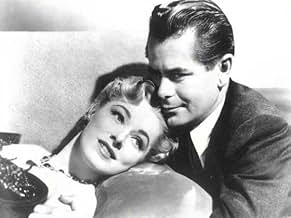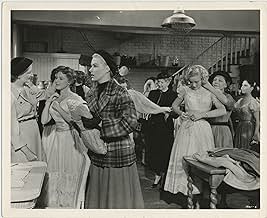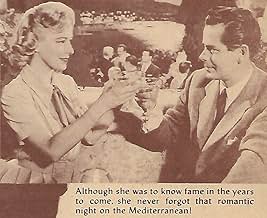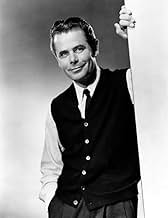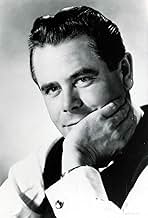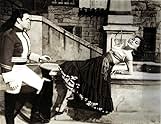NOTE IMDb
6,7/10
1,3 k
MA NOTE
Ajouter une intrigue dans votre langueThis movie chronicles Australian-born opera star Marjorie Lawrence's success, her battle with polio, and her eventual career comeback.This movie chronicles Australian-born opera star Marjorie Lawrence's success, her battle with polio, and her eventual career comeback.This movie chronicles Australian-born opera star Marjorie Lawrence's success, her battle with polio, and her eventual career comeback.
- Réalisation
- Scénario
- Casting principal
- Récompensé par 1 Oscar
- 1 victoire et 3 nominations au total
Phyllis Altivo
- Louise
- (non crédité)
Benjie Bancroft
- Doctor
- (non crédité)
Francis Barnes
- Singer
- (non crédité)
Louise Bates
- Party Guest
- (non crédité)
Mary Bayless
- Backstage Well-Wisher
- (non crédité)
George Blagoi
- Audience Member
- (non crédité)
Heinz Blankenburg
- Baritone
- (non crédité)
Lulu Mae Bohrman
- Backstage Well-Wisher
- (non crédité)
Avis à la une
'Interrupted Melody' is the film adaptation of Australian soprano Marjorie Lawrence's autobiography. It tells the fascinating tale of the young woman's thunderous ascent to stardom, her marriage to Dr Thomas King (Glenn Ford), and finally deals with her struggles with polio.
The great Eleanor Parker delivers a fantastic performance as Lawrence (with the equally fine Eileen Farrell providing the voice of the Australian prima donna). Parker's acting here is wonderfully appropriate, and captures the intense but subtly delicate style of the great operatic stars of the time. With sumptuous sets, costumes and, of course, music, 'Interrupted Melody' seems to equate to a practically perfect film. In my opinion though, the reality is not quite the case. Lawrence's story is one that is wrought with drama and this movie just doesn't do it complete justice.
Nevertheless, 'Interrupted Melody' is a film worth seeing, for all the reasons mentioned earlier. There are many memorable scenes throughout the movie; the ones that deal with her battle against illness are particularly moving. And when, finally, she triumphs after a great fight, both emotionally and physically, it is indeed very poignant.
The great Eleanor Parker delivers a fantastic performance as Lawrence (with the equally fine Eileen Farrell providing the voice of the Australian prima donna). Parker's acting here is wonderfully appropriate, and captures the intense but subtly delicate style of the great operatic stars of the time. With sumptuous sets, costumes and, of course, music, 'Interrupted Melody' seems to equate to a practically perfect film. In my opinion though, the reality is not quite the case. Lawrence's story is one that is wrought with drama and this movie just doesn't do it complete justice.
Nevertheless, 'Interrupted Melody' is a film worth seeing, for all the reasons mentioned earlier. There are many memorable scenes throughout the movie; the ones that deal with her battle against illness are particularly moving. And when, finally, she triumphs after a great fight, both emotionally and physically, it is indeed very poignant.
MGM fashioned a sumptuous, full-scale production in bringing the career of Australian opera diva Marjorie Lawrence to the screen. Heading the cast as Lawrence is the fine Eleanor Parker, in one of her most impressive roles. Co-starring as her supportive doctor-husband is the talented Glenn Ford. Both are most convincing in relaying the inspirational "real life" story of their struggle with physical- career- and marital-obstacles.
Whether Lawrence did in fact sing roles which included lyric soprano, dramatic soprano, mezzo and Wagnerian, as depicted here, is open to question. Still, it is lovely to see these excerpts staged so beautifully, and in gorgeous Technicolor. Of invaluable assistance is the magnificent voice of Eileen Farrell in a remarkably varied repertoire.
It may not be possible to experience the real impact of these scenes unless there is a special house revival with a full-sized Cinemascope screen and stereo sound. The formats of VHS and even DVD to not do justice to the original production.
Although Lawrence assisted on the script, the actual unfoldment has the ring of fact merging with fiction for maximum dramatic impact. Now that Lawrence's 30's and 40's career is but a memory in the minds of a few, what remains is this romanticized version of history. As such, lovers of romantic drama and of music may revel in a tale of ardor and challenge, with the artistic product being the "fusion of the arts": grand opera.
Whether Lawrence did in fact sing roles which included lyric soprano, dramatic soprano, mezzo and Wagnerian, as depicted here, is open to question. Still, it is lovely to see these excerpts staged so beautifully, and in gorgeous Technicolor. Of invaluable assistance is the magnificent voice of Eileen Farrell in a remarkably varied repertoire.
It may not be possible to experience the real impact of these scenes unless there is a special house revival with a full-sized Cinemascope screen and stereo sound. The formats of VHS and even DVD to not do justice to the original production.
Although Lawrence assisted on the script, the actual unfoldment has the ring of fact merging with fiction for maximum dramatic impact. Now that Lawrence's 30's and 40's career is but a memory in the minds of a few, what remains is this romanticized version of history. As such, lovers of romantic drama and of music may revel in a tale of ardor and challenge, with the artistic product being the "fusion of the arts": grand opera.
I studied opera with Marjorie Lawrence and her students always enjoyed gathering to watch this film.
I studied opera with Marjorie Lawrence in the 1970's and she was an incredible, vital, and exciting personality. She was larger than life and her presence dominated any gathering she attended.
The movie captures many of her physical mannerisms. Her voice was most suited to the Wagnerian repertoire and the selection of the great Eileen Farrel to sing the more popular arias chosen for the film was an excellent one. However, Miss Lawrence was disappointed that her own voice wasn't used as had been agreed, which I understand resulted in a settlement in her favor.
Her husband, Doctor King, was an great gentleman and devoted to her.
Following the years depicted in the film, she became an educator at Southern Illinois University where she was very respected and loved.
The movie captures many of her physical mannerisms. Her voice was most suited to the Wagnerian repertoire and the selection of the great Eileen Farrel to sing the more popular arias chosen for the film was an excellent one. However, Miss Lawrence was disappointed that her own voice wasn't used as had been agreed, which I understand resulted in a settlement in her favor.
Her husband, Doctor King, was an great gentleman and devoted to her.
Following the years depicted in the film, she became an educator at Southern Illinois University where she was very respected and loved.
The film does a fine job with the crippling illness of Lawrence and her comeback onstage, but most notable are the performances by the stars. Glenn Ford and Eleanor Parker were never better. Just superb. The scene where she tried to commit suicide and Ford stopped her, broke down, and asked God for help is magnificent and a must-see. Ford and Parker should be well-remembered as excellent actors.
This film will always have a great significance to me because it introduced me to the beauty of opera. Marjorie Lawrence was a major soprano with the Metropolitan Opera, and her career was cut short by polio while she was still in her vocal prime. Her story is told with great sensitivity and warmth. The operatic scenes are done to perfection, with the superb soprano Eileen Farrell doing the vocals. Eleanor Parker is seen here in what must be her greatest work as an actress. Parker was a great, if somewhat under-appreciated actress, and she was a beautiful woman. Of course, it is she who dominates the movie. Glenn Ford provides excellent support as her doctor husband who guides her back to her career. When this film was released, I was ten years old, and kept going back again and again to see it over and over. I loved the music, loved the story, and will forever be indebted to it for having introduced me to the beauty of grand opera. If I had to choose a film as the most important of my life, it would have to be this one.
Le saviez-vous
- AnecdotesEleanor Parker can read music, and has perfect pitch as a singer. She decided to study the scores of the opera songs used in this movie on her own. She rented a cabin in Lake Arrowhead, California, and played the records while singing along, until she had the breathing and phrasing memorized. Then when filming the scenes, instead of lip-synching to the tracks recorded by Eileen Farrell for the movie, she sang full voice (but an octave lower). She is proud of the fact that they never had to do a re-take, in order to "match" the tapes. She nailed it on the first take every time.
- GaffesAfter Marjorie sings "Annie Laurie" and she wheels herself into the kitchen and she suggests a concert tour, right as she and Dr. King are embracing .
- Citations
Marjorie Lawrence: [drinking champagne] Tonight I love the whole world and I want them to know it.
Dr. Thomas King: And tomorrow you'll have a monumental hangover.
Marjorie Lawrence: That's the advantage of going out with doctors.
- ConnexionsFeatured in 1955 Motion Picture Theatre Celebration (1955)
- Bandes originalesDon Carlos
(1867) (uncredited)
Music by Giuseppe Verdi
Libretto by François Joseph Méry and Camille du Locle
Aria "O don fatale" Performed by Eleanor Parker (dubbed by Eileen Farrell) with piano accompaniment
Meilleurs choix
Connectez-vous pour évaluer et suivre la liste de favoris afin de recevoir des recommandations personnalisées
- How long is Interrupted Melody?Alimenté par Alexa
Détails
Box-office
- Budget
- 2 367 000 $US (estimé)
- Durée
- 1h 46min(106 min)
- Rapport de forme
- 2.55 : 1
Contribuer à cette page
Suggérer une modification ou ajouter du contenu manquant



